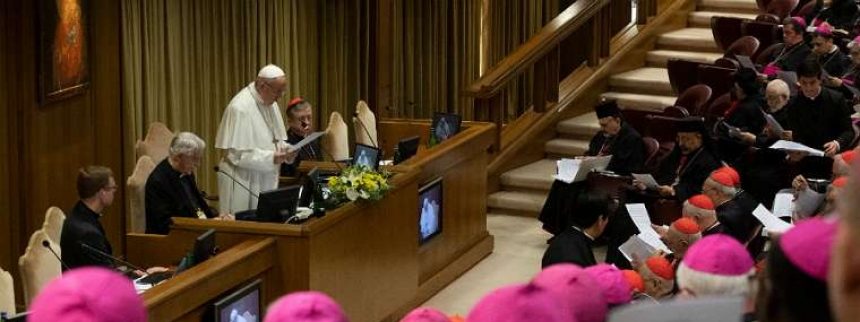
Vatican City -- Opening the Vatican summit on child protection and the clerical sexual abuse crisis, Pope Francis said Feb. 21, "The holy people of God are watching and are awaiting from us not simple, predictable condemnations, but concrete and effective measures" to stop abuse.
The summit meeting Feb. 21-24 brought together almost 190 church leaders: the presidents of national bishops' conferences, the heads of the Eastern Catholic churches, superiors of some men's and women's religious orders and top Vatican officials.
In his brief opening remarks, the pope prayed that with "docility" to the Holy Spirit, the bishops at the summit would "listen to the cry of the little ones who ask for justice."
Pope Francis gave participants a list of nearly two dozen discussion points for actions Catholic Church leaders could potentially take in the follow-up to the meeting.
The 21 points include suggestions to have periodic reviews of protocols on safeguarding, handbooks of steps authorities should take in abuse cases, provisions for facilitating the participation of lay experts in investigations, and the direction to inform civil authorities and higher Church authorities in compliance with civil and canonical norms.
Archbishop Charles Scicluna of Malta, responding to questions from journalists in the afternoon on Thursday said the points are complete, and a “roadmap” for the bishops’ discussions this week.
He also said that were they to be made into concrete proposals, they would need “substantial revision.”
In regard to one point, that broaches the idea of amending the Code of Canon Law to raise the minimum age of marriage for women from 14 to 16, Scicluna clarified that bishops' conferences already have the power to create their own legislation in regard to the minimum marriageable age, and that many had already raised the age to 16 for both men and women.
“The pope is suggesting making that universal law,” Scicluna said.
Other points the pope raised in the list were to “accompany, protect and treat victims, offering them all the necessary support for a complete recovery” and to establish easily-accessible groups made up of experts, including both clerics and laypeople, to which victims can report crimes.
Several of the suggestions are on the theme of seminary formation of priests and the proper penalties for priests or religious who commit abuse.
One suggests initial and ongoing formation for seminarians and candidates for religious life, to help them “develop their human, spiritual and psycho-sexual maturity, as well as their interpersonal relationships and behavior.”
Another recommends observing “the traditional principle of proportionality of punishment with respect to the crime committed” and another recalls the right to defense and the importance of the presumption of innocence.
“Therefore, it is necessary to prevent the lists of the accused being published, even by the dioceses, before the preliminary investigation and the definitive condemnation,” it states.
For live-stream, texts and information on the meeting on the protection of minors in the church, visit https://www.pbc2019.org/home.
In photo above, Pope Francis at the meeting on protection of minors in the church in the Vatican's New Synod Hall, Feb. 21, 2019. Credit: Vatican Media.

